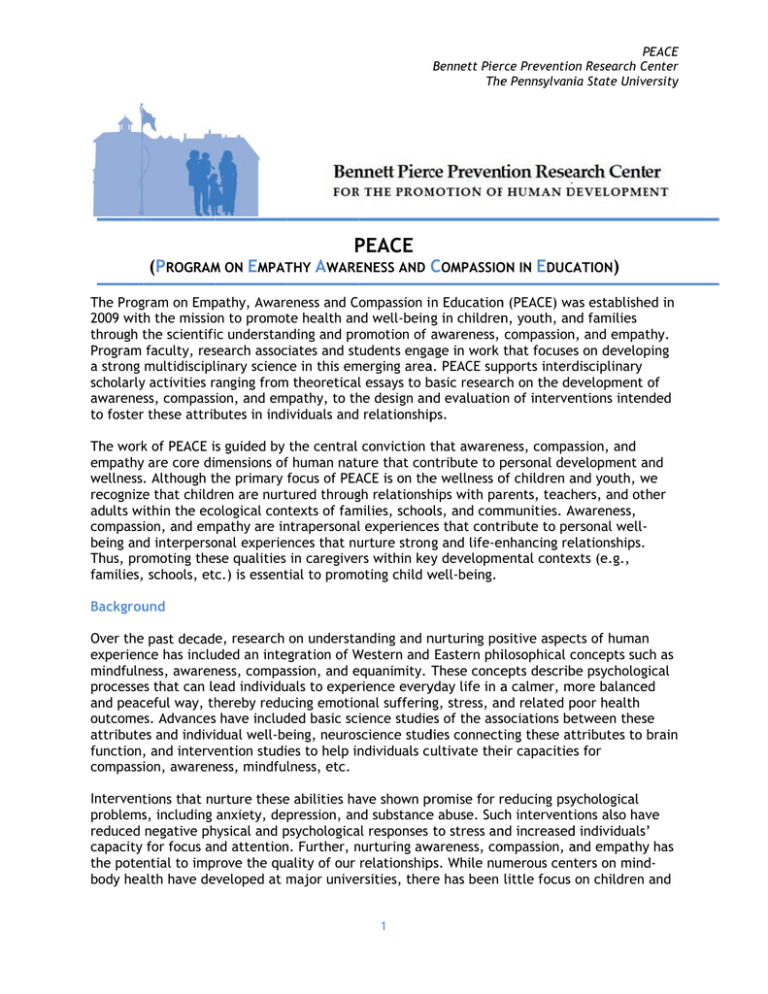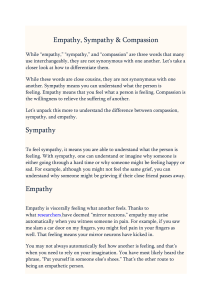P ( E
advertisement

P PEACE Bennett Pierrce Preventio on Research C Center The e Pennsylvaniia State Univversity PEACE P (PROGRAM M ON EMPAT THY AWARE ENESS AND COMPASSIO ON IN EDUCA ATION) The Prog gram on Emp pathy, Aware eness and Compassion i n Education n (PEACE) wa as establishe ed in 2009 with the missio on to promotte health an nd well-bein g in children n, youth, an nd families through the t scientifiic understan nding and prromotion of awareness, compassion n, and empatthy. Program faculty, ressearch assocciates and sttudents engaage in work that focusess on develop ping a strong multidiscipllinary sciencce in this em merging areaa. PEACE sup pports interd disciplinary scholarly y activities ranging r from m theoreticall essays to b basic researcch on the de evelopment of awareness, compassion, and em mpathy, to th he design an nd evaluation of interve entions inten nded to fosterr these attrib butes in indiividuals and relationship ps. The work k of PEACE is guided by the central conviction tthat awaren ness, compassion, and empathy y are core dimensions off human nature that con ntribute to p personal devvelopment a and wellness. Although the t primary focus of PEA ACE is on the e wellness o of children a and youth, w we recognize e that childrren are nurttured throug gh relationsh hips with paarents, teach hers, and other adults wiithin the eco ological contexts of fam milies, schoo ols, and com mmunities. A Awareness, compassiion, and empathy are in ntrapersonall experience es that contrribute to pe ersonal well-being and d interperso onal experiences that nu urture stron g and life-enhancing re elationships. Thus, pro omoting the ese qualities in caregivers within ke y developmental contexxts (e.g., families, schools, etc.) is essenttial to promo oting child w well-being. Backgrou und Over the past decade, research on understa anding and n nurturing po ositive aspeccts of human n experience has inclu uded an inte egration of Western W and Eastern phiilosophical cconcepts succh as mindfuln ness, awaren ness, compassion, and equanimity. e These conce epts describ be psychologgical processes that can le ead individu uals to experrience everyyday life in a calmer, m more balance ed and peac ceful way, th hereby redu ucing emotio onal sufferin ng, stress, an nd related p poor health outcomes. Advancess have includ ded basic sciience studie es of the asssociations be etween thesse attribute es and individual well-be eing, neurosscience stud dies connectting these atttributes to brain function,, and interve ention studies to help in ndividuals c ultivate the eir capacitiess for compassiion, awareness, mindfulness, etc. Interventtions that nu urture these e abilities ha ave shown p promise for rreducing psyychological problemss, including anxiety, depression, an nd substance e abuse. Succh interventiions also havve reduced negative ph hysical and psychologica p al responses to stress an nd increased d individuals’ capacity for focus an nd attention n. Further, nurturing n aw wareness, co ompassion, a and empathyy has the potential to improve the quality of our relationship ps. While numerous centters on mind dbody hea alth have de eveloped at major m unive ersities, therre has been little focus on children and 1 PEACE Bennett Pierce Prevention Research Center The Pennsylvania State University youth or the cultivation of these attributes in the early and most malleable stages of development. Center Goals 1. To conduct and support high-quality scholarship on compassion, awareness, and empathy and their associations with well-being in children, youth, and those who care for and educate them. 2. To develop and evaluate interventions to promote the development of compassion, awareness, and empathy within individuals and contexts. 3. To create a community of scientists and practitioners that value and support the development of these attributes in families, schools, and communities. 4. To disseminate scientific findings to support innovation in families, schools, and communities 2




